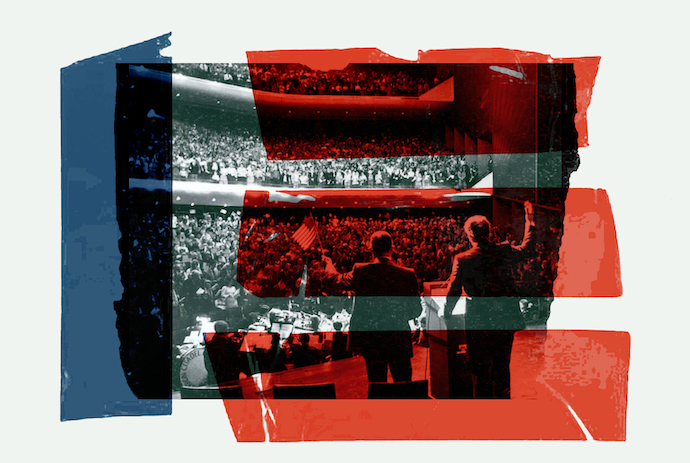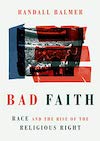The Religious Right’s most cherished and durable myth is its myth of origins. According to this well-rehearsed narrative, articulated by Jerry Falwell, Pat Robertson, and countless others, evangelical leaders were shaken out of their political complacency by the United States Supreme Court’s Roe v. Wade decision of January 22, 1973. Falwell even recounted, albeit fourteen years later, his horror at reading the news in the January 23, 1973, edition of the Lynchburg News. “The Supreme Court had just made a decision by a seven-to-two margin that would legalize the killing of millions of unborn children,” Falwell wrote. “I sat there staring at the Roe v. Wade story growing more and more fearful of the consequences of the Supreme Court’s act and wondering why so few voices had been raised against it.”
This myth of origins has Falwell and other evangelical leaders emerging like mollusks out of their apolitical stupor to fight the moral outrage of legalized abortion. Some even went so far as to invoke the moniker “new abolitionists” in an apparent effort to ally themselves with their antebellum evangelical predecessors who sought to eradicate the scourge of slavery.The rhetoric about abortion being the catalyst for the rise of the Religious Right, however, collapses under scrutiny. Evangelicals considered abortion a “Catholic issue” until the late 1970s. In 1968, the flagship evangelical magazine Christianity Today convened a conference with another evangelical organization, Christian Medical Society, to discuss the ethics of abortion. After several days of deliberations, twenty-six evangelical theologians issued a statement acknowledging that they could not agree on any one position, that the ambiguities of the issue allowed for many different approaches. “Whether the performance of an induced abortion is sinful we are not agreed,” the statement read, “but about the necessity of it and permissibility for it under certain circumstances we are in accord.” The statement cited “individual health, family welfare, and social responsibility” as possible justifications for abortion and allowed for instances when fetal life “may have to be abandoned to maintain full and secure family life.”
Evangelicals in the late 1960s and throughout most of the 1970s by and large refused to see abortion as a defining issue, much less a matter that would summon them to the front lines of political activism. Abortion simply failed to gain traction among evangelicals, and some groups with historic ties to evangelicalism pushed for legalization. In 1970, for example, the United Methodist Church General Conference called on state legislatures to repeal laws restricting abortion, and in 1972, at a gathering Jimmy Carter addressed while governor of Georgia, the Methodists acknowledged “the sanctity of unborn human life” but also declared that “we are equally bound to respect the sacredness of the life and well-being of the mother, for whom devastating damage may result from unacceptable pregnancy.”
Meeting in St. Louis, Missouri, during the summer of 1971, the messengers (delegates) to the Southern Baptist Convention passed a resolution that stated, “we call upon Southern Baptists to work for legislation that will allow the possibility of abortion under such conditions as rape, incest, clear evidence of severe fetal deformity, and carefully ascertained evidence of the likelihood of damage to the emotional, mental, and physical health of the mother.” The Southern Baptist Convention, hardly a redoubt of liberalism, reaffirmed that position in 1974, the year after the Roe decision, and again in 1976.
When the Roe decision was handed down on January 22, 1973, W. A. Criswell, former president of the Southern Baptist Convention and pastor of First Baptist Church in Dallas, Texas, expressed his satisfaction with the ruling. “I have always felt that it was only after a child was born and had a life separate from its mother that it became an individual person,” one of the most famous fundamentalists of the twentieth century declared, “and it has always, therefore, seemed to me that what is best for the mother and for the future should be allowed.”
Baptists, in particular, applauded the Roe decision as an appropriate articulation of the line of division between church and state, between personal morality and state regulation of individual behavior. “Religious liberty, human equality and justice are advanced by the Supreme Court abortion decision,” W. Barry Garrett of Baptist Press wrote. Floyd Robertson of the National Association of Evangelicals disagreed with the Roe decision, but he believed that legal redress should not be a priority for evangelicals. “The abortion issue should also remind evangelicals that the church must never rely on the state to support its mission or enforce its moral standards,” he wrote in the summer 1973 issue of the organization’s newsletter, United Evangelical Action. “The church and state must be separate. The actions and conduct of Christians transcend the secular community for which the state is responsible.”
A few evangelical voices, including Christianity Today, questioned the ruling, although the magazine published an editorial three years later entitled “Is Abortion a Catholic Issue?” That editorial affirmed the general principle of right to life but concluded: “There are, of course, other considerations, such as the rights of the parents and the much-debated question of when life begins.”
The overwhelming response to Roe v. Wade on the part of evangelicals was silence, and the voices that spoke on the matter were ambivalent. Two successive editors of Christianity Today, Carl F. H. Henry and Harold Lindsell, equivocated on abortion. Henry affirmed that “a woman’s body is not the domain and property of others”; Lindsell allowed that, “if there are compelling psychiatric reasons from a Christian point of view, mercy and prudence may favor a therapeutic abortion.” Even James Dobson, who later became an implacable foe of abortion, acknowledged in 1973 that the Bible was silent on the matter and therefore it was plausible for an evangelical to believe that “a developing embryo or fetus was not regarded as a full human being.”
In 1977, another voice, one well respected in evangelical circles, joined the conversation. Introducing himself as “a Christian, as a father, as a minister of the gospel, and as a professor of theology,” Walter Martin, a Baptist minister, founder of the Christian Research Institute, and longtime columnist for Eternity magazine, took on the issue in a small book entitled Abortion: Is It Always Murder? Martin determined that abortion was impermissible as a form of contraception, but he added that it should be allowed in cases of rape and incest or to protect the health of the mother. “I think the people who are against abortion in any form have presumed to instruct the Deity,” Martin wrote. “But you cannot say that abortion is always murder.” He allowed that Christians were entitled to challenge the law of the land—“It is better to obey God than men”—but he concluded, “We need for God’s sake to stop making dogmatic declarations in every area of abortion.”
Opposition to abortion was slow to take hold among evangelicals. Falwell issued no public statement on abortion until 1975 and, by his own admission, did not preach against abortion until February 26, 1978, more than five years after the Roe v. Wade decision. In 2011, an early antiabortion activist reflected on his reception among evangelicals in the 1970s. “While we evangelicals were dithering,” Robert Case recalled, “the Roman Catholics were bearing the torch of salvation for America’s unborn.” He described his “lukewarm” reception at a meeting of the Evangelical Theological Society and lamented, “Here we were four years after Roe v. Wade and evangelical Christians were still ambivalent about abortion.”
Despite the persistence of the abortion myth, endlessly propagated by leaders of the Religious Right, evangelicals considered abortion a “Catholic issue” until the late 1970s, and even then, opposition to abortion was slow to take hold.
This excerpt has been published with the permission of Eerdmans.






